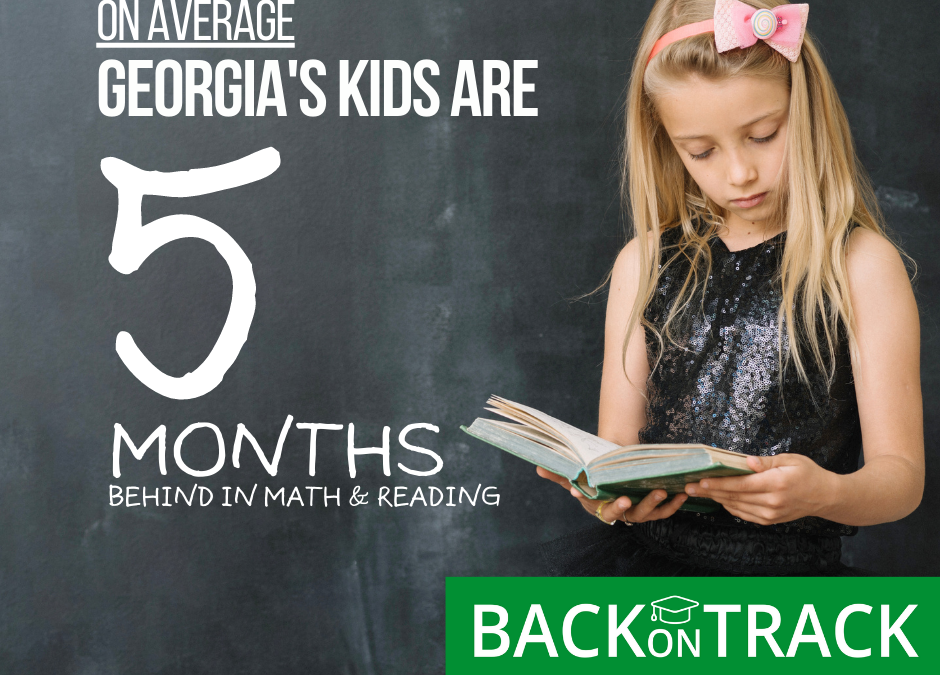
by David Bass | Jan 18, 2022
Georgia’s K-12 students fell months behind during remote learning. We need solutions now.
Georgia’s K-12 students fell months behind during remote learning. We need solutions now.
Why it Matters:
We can move forward. Let your voice be heard.
Between three and six months behind.
That’s how severe learning losses have been for Georgia’s K-12 students during the pandemic, according to a new official report from the Georgia Department of Audits and Accounts Performance Audit Division. The learning loss was prompted due to school closures and forced online learning, which didn’t work well for many students.
Not surprisingly, the impacts were hardest on kids from low-income, minority families, and those where English is a second language. In other words, the families who could least afford or navigate the disruptions were impacted the most.
For example, the report found students in majority white schools were four months behind in math and three months behind in reading. Contrast that with majority black schools, where students were behind by six months in both reading and math, on average.
For a solution, the report strongly recommended federal COVID-19 relief funds be used to combat learning losses and put the best interventions in place.
We agree, but that’s only a starting place. Every parent across Georgia must have the ability to choose the right school for their child, now more than ever. Especially during a pandemic when students are falling further and further behind, we can’t afford to make the issue of educational opportunity a political talking point. Kids’ lives and futures hang in the balance.
Now more than ever, your voice as a parent is crucial. We want to amplify your voice and make sure our education leaders across Georgia hear it loud and clear. Sign our petition and tell leaders that it’s time to get our kids back on track!

by Georgia Center for Opportunity | Feb 13, 2018
On Monday, lawmakers in the Georgia House Ways and Means Committee overwhelmingly passed House Bill 482, a measure that would make Education Savings Accounts (ESAs) a reality in the Peach State. Representatives Paul Battles (R- Cartersville), Allen Peake (R- Macon), Chuck Martin (R- Alpharetta), Trey Kelley (R- Cedartown), Dale Rutledge (R- McDonough), David Knight (R- Griffin), Sam Teasley (R- Marietta), Jay Powell (R-Camilla), Shaw Blackmon (R- Bonaire), and Brett Harrell (R- Snellville) all deserve thanks for their role in the bill’s approval.
As HB 482 advances through the legislature, it seems possible that Georgia could become the seventh state to pass ESAs
The idea is simple. Georgia taxpayers currently pay more than $10,000 per student per year for public school education. Parents who withdraw their child from public schools and opt for an ESA would be given a percentage of that money to spend on their child’s education. That money can cover private school tuition, private tutoring, educational therapy, textbooks, online classes, or other educational expenses. Money that’s left over upon high school graduation can be used for college expenses. This empowers parents – who know and love their kids more than any bureaucrat or government official – to take a more active role in their child’s education.
Thanks to an ESA program in Florida, Faith Kleffel, a student with Down Syndrome, was able to access the physical and occupational therapy she needed to thrive. Arizona’s program allows students with autism to attend a school specifically designed with their needs in mind. ESA programs in other states have allowed students to succeed when traditional schools weren’t able to supply what they needed.
Education Savings Accounts give parents more freedom to find the best education for their kids. Launching an ESA program in Georgia will be a win for Georgia kids and Georgia families.

by Georgia Center for Opportunity | Jan 19, 2018
With much ceremony, the Georgia General Assembly kicked off the 2018 legislative session last week. Thanks to election-year buzz, candidates have fueled talk of big education reforms that could see needed movement. Because this session is expected to fly by, we have our eye on a couple of key school choice bills that could shuffle through the process quickly.
Here are two important pieces of legislation that we hope will (finally) get the traction they deserve in the State House and Senate.
Tax Credit Scholarship Expansion
No child should be denied the opportunity to seek out the education they need because of an arbitrary government roadblock, but that’s exactly what’s happening to thousands of Georgia students.
The state currently offers limited access to a popular tax credit scholarship, allowing only a small number of families an opportunity to seek out the right education for their children. However, a low cap on donated funds has meant that generous contributors- and students the program is supposed to serve- have been turned away by the state because of over-demand.
Lawmakers are said to be considering raising the program’s $58 million ceiling, which would lift barriers for many more Georgia children. Because the kids waiting in line for scholarships can’t afford another year in the wrong classroom, we’re urging the legislature to waste no time in passing an expansion of the tax credit scholarship bill.
Education Savings Accounts
Education Savings Accounts (ESAs) aim to provide needed flexibility and customized education options for Georgia parents. Similar to Flexible Spending Accounts (FSAs) or Health Savings Accounts (HSAs), under an ESA, the state would put money into a restricted account for education expenses that parents would control.
While there are several versions of the legislation that seek to fit the needs of different families-such as those in the military or those with children who have disabilities- the passage of nearly any of these bills would make a big impact in the lives of many Georgia parents.
The Georgia Center for Opportunity is committed to removing barriers for our state’s kids so that they receive the education they need. While the legislature will have their hands full, we hope they agree that bills benefitting children and their families should stand out among their highest priorities. To follow the progress of these bills with us, check back on our blog or subscribe to the GCO’s newsletter.
by Georgia Center for Opportunity | Mar 18, 2015

Critics of Educational Savings Accounts often raise the issue of the constitutional challenges of using taxpayer funds to purchase private education.
Recently, Jason Bedrick of the CATO Institute and Lindsey Burke of the Heritage Foundation highlighted this issue in their article published in National Affairs, writing, “While the United States Supreme Court has ruled that publicly funded school vouchers are constitutional under the First Amendment’s Establishment Clause, most state constitutions contain a version of the so-called ‘Blaine Amendment,’ which bars state aid to parochial schools.”[1]
The Blaine Amendments owe their name to James G. Blaine, Speaker of the U.S. House of Representatives, who proposed a U.S. constitutional amendment in 1875 prohibiting states from funding religious education. The amendment’s original intent was to prevent Catholics from acquiring taxpayer support for their schools. While his proposed amendment failed to become part of the U.S. Constitution, more than two-thirds of the 50 states adopted their own constitutional amendments barring state funding of religious organizations that include schools, which have come to be known as the Blaine Amendments.
To understand how the Blaine Amendments affect ESAs in Georgia, a recent report written by GCO Scholar Dr. Eric Wearne and the Georgia Public Policy Foundation provides important insight on this issue:[2]
In recent decades, these [Blaine] amendments have been interpreted by some to be prohibitions against any use of state funds for any schools other than public schools, and to prevent public funding of other faith-based initiatives, of any kind. Georgia’s Blaine Amendment reads:
…[n]o money shall ever be taken from the public treasury, directly or indirectly, in aid of any church, sect, cult, or religious denomination or of any sectarian institution. Ga. Const. art. I, § II, ¶ VII.
However, Title 20 of the Georgia Constitution also states that,
Educational assistance programs authorized. (a) Pursuant to laws now or hereafter enacted by the General Assembly, public funds may be expended for any of the following purposes:
(1) To provide grants, scholarships, loans, or other assistance to students and to parents of students for educational purposes.[3]
ESAs avoid many of the legal issues that may arise through other programs, such as vouchers and tuition tax credits… Matthew Ladner argues that “It is unlikely that ESAs would ever be less constitutionally robust than vouchers. … Designing programs so that the aid has multiple uses and is clearly under the complete control of parents can only help or be neutral in a constitutional challenge.”[4] Though vouchers have been held to be constitutional under certain conditions by the U.S. Supreme Court,[5] ESAs may avoid even these challenges.”[6]
Bedrick and Burke argue this point even further:
The example of Arizona is encouraging on this point for advocates of ESAs. Despite having previously struck down vouchers, in March 2014 the Arizona Supreme Court declined to review an appeals-court decision upholding the state’s ESA law. The court distinguished the ESAs from vouchers because the latter “set aside state money to allow students to attend private schools” whereas under the ESA law, “the state deposits funds into an account from which parents may draw to purchase a wide range of services” and “none of the ESA funds are pre-ordained for a particular destination.”
Given the precedent set by the Arizona Supreme Court and the authority granted by Title 20 of the Georgia Constitution, supporters of ESAs should not allow themselves to worry too much concerning the constitutionality of this innovative program.
Notes
[1] https://www.nationalaffairs.com/publications/detail/the-next-step-in-school-choice
[2] https://georgiapolicy.org/ftp_files/ESA_121714.pdf
[3] https://sos.ga.gov/admin/files/Constitution_2013_Final_Printed.pdf
[4] https://www.edchoice.org/Research/Reports/The-Way-of-the-Future–Education-Savings-Accounts-for-Every-American-Family.aspx
[5] https://www.edreform.com/2012/01/legal-summary-zelman-v-simmons-harris/
[6] See, for example, the current challenge to Georgia’s Tax Credit program. https://reason.com/archives/2014/05/07/georgia-school-choice-legal-challenge
by Eric Cochling | Feb 4, 2015

We are very pleased to report that Rep. Mark Hamilton introduced a bill today to create Education Savings Accounts (ESAs) in Georgia (Read HB 243: “Education Savings Account Act”). ESAs are a terrific way to give parents and their students a choice when it comes to education. They’re flexible, allow for parents to tailor their child’s education, and they allow the money to follow the child. It’s everything you want in a great school choice program.
For more info, read our press release on the legislation.
*UPDATE: February 9, 2015
Senator Hunter Hill introduced a bill to create ESAs in Georgia: Read SB 92





